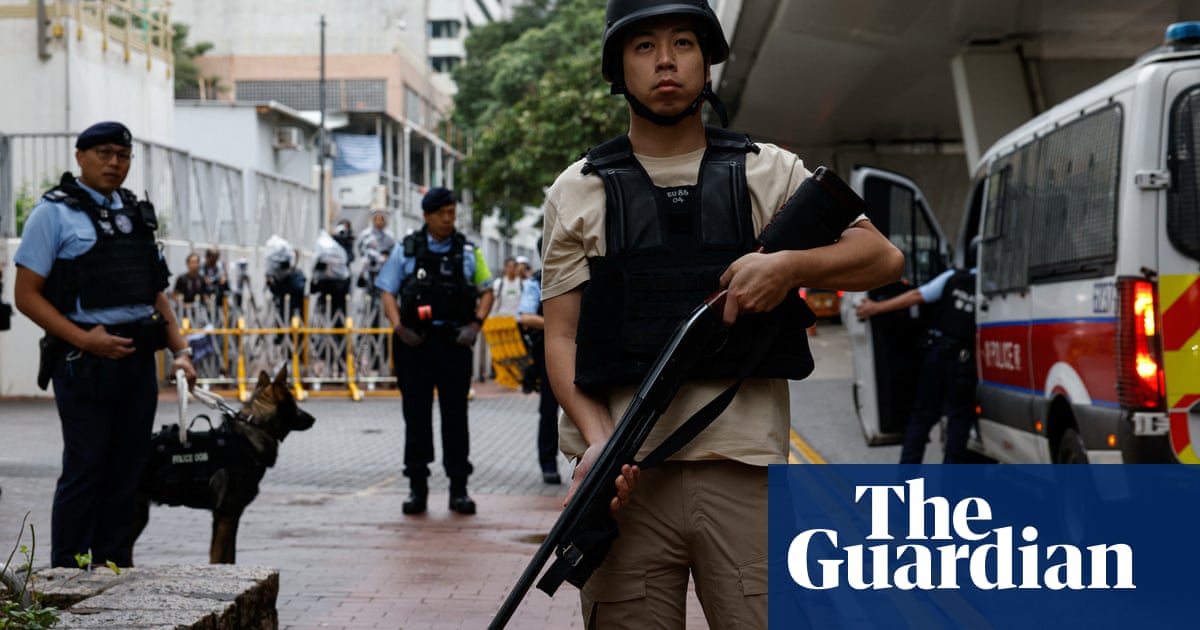Governments and human rights groups have expressed concern and outrage at the sentencing of 45 pro-democracy activists in Hong Kong after the city’s largest national security trial.
On Tuesday, a court handed down sentences, ranging from four years and two months to 10 years, to activists, former legislators, councillors and academics, who with two people acquitted in May made up a group known as the Hong Kong 47.
The activists had been arrested in 2021 under the city’s national security law (NSL) for their participation in an unofficial primary election that was held in July 2020, weeks after the NSL had been imposed by Beijing in response to months of pro-democracy protests. More than 600,000 people participated in the unofficial vote.
A spokesperson for the US consulate in Hong Kong said that the US “strongly condemns” the sentences, adding that the defendants were “aggressively prosecuted and jailed for peacefully participating in normal political activity”.
Benny Tai, a legal academic and activist who pleaded guilty, was sentenced to 10 years in jail for his role as an organiser of the primaries. Tai’s is the longest sentence handed out so far under the NSL, which was introduced by Beijing on 30 June 2020.
Tai was accused of being the “mastermind” behind a plan for the city’s pro-democracy camp to win a majority in the upcoming legislative council election, and then block bills and eventually force the dissolution of the legislature and resignation of the chief executive.
Joshua Wong, a student leader of the 2014 umbrella movement who was once the most recognisable face of the pro-democracy camp, was sentenced to four years and eight months in prison. He received a sentence reduction for pleading guilty. The court said he was an “active participant” in the primaries plan, and “not of good character” because of his previous protest-related convictions. The 28-year-old reportedly shouted “I love Hong Kong” as he left the dock on Tuesday.
Western governments, human rights organisations and legal groups have criticised the prosecution since it began, characterising it as a politically motivated attack on the pro-democracy opposition. Maya Wang, associate China director at Human Rights Watch, said the sentences “reflect just how fast Hong Kong’s civil liberties and judicial independence have nosedived in the past four years”, while Hong Kong’s last British governor, Chris Patten, called them a “sham”.
“The sentencing of 45 of the 47 Hong Kong democrats is not only an affront to the people of Hong Kong, but those who value rights and freedoms around the world,” Patten said. “These brave individuals were an integral part of defining the pro-democracy movement in Hong Kong, and were peacefully supported by thousands through votes.”
Catherine West, the UK’s minister for the Indo-Pacific, said: “Today’s sentencing is a clear demonstration of the Hong Kong authorities’ use of the NSL to criminalise political dissent. Those sentenced today were exercising their right to freedom of speech, of assembly and of political participation.”
The trial was overseen by three government-picked judges without a jury – one of the many provisions of the NSL that critics have described as punitive and antithetical to the rule of law in Hong Kong.
Anna Kwok, the executive director of the US-based Hong Kong Democracy Council, condemned the sentencing as “a hostile demonstration of determined repression against Hongkongers who dare to stand up and speak out for their rights”.
The Australian-Hong Kong dual-national Gordon Ng, among 16 of the 47 defendants to plead not guilty, was sentenced to more than seven years.
Australia’s foreign minister, Penny Wong, said her government was “gravely concerned” about Ng’s sentence, and had expressed its “strong objections to the Chinese and Hong Kong authorities on the continuing broad application of national security legislation”.
Jonathan Sumption, a leading British judge who in June quit Hong Kong’s judiciary in protest at the activists’ convictions, said the sentences were “not surprising”.
“The real outrage is their conviction in the first place,” Lord Sumption said. “These people were respectable politicians, journalists, academics and trade unionists, lawfully campaigning for a majority of the elective seats in the legislative council with a view to obtaining faster progress towards universal suffrage, something which is stated in the basic law to be the ultimate aim.” The basic law is Hong Kong’s mini-constitution.
Beijing rejected western criticism, which it said “seriously desecrates and tramples on the spirit of the rule of law”. The Chinese foreign ministry said that it supported Hong Kong, was safeguarding national security and that “no one should be allowed to use democracy as a pretext to escape law and break justice”.
Of the 47, 31 had pleaded guilty, and two were acquitted at trial. Most have spent more than three years in jail already. Those who pleaded not guilty were given harsher sentences.
The former Stand News journalist Gwyneth Ho, who pleaded not guilty, was sentenced to seven years in jail. She ran as a candidate in the 2020 unofficial primary.
Shortly after the sentencing, Ho published a statement on social media, saying she had been prosecuted for participating in “the last free and fair election in Hong Kong”.
She said: “Behind the rhetoric of secession, collusion with foreign forces, etc, our true crime for Beijing is that we were not content with playing along in manipulated elections.”
Ho said the case marked a “turning point” when Hong Kong was seen as a lost cause, but she urged supporters to push back against authoritarianism. “Prove to the world at every possible moment, no matter how small, that democracy is worth fighting for,” she said.
Additional reporting and research by Jason Lu

